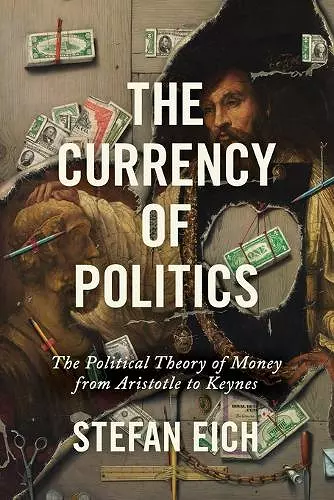The Currency of Politics
The Political Theory of Money from Aristotle to Keynes
Format:Paperback
Publisher:Princeton University Press
Published:17th Oct '23
Should be back in stock very soon
This paperback is available in another edition too:
- Hardback£40.00(9780691191072)

Money in the history of political thought, from ancient Greece to the Great Inflation of the 1970s
In the wake of the 2008 financial crisis, critical attention has shifted from the economy to the most fundamental feature of all market economies—money. Yet despite the centrality of political struggles over money, it remains difficult to articulate its democratic possibilities and limits. The Currency of Politics takes readers from ancient Greece to today to provide an intellectual history of money, drawing on the insights of key political philosophers to show how money is not just a medium of exchange but also a central institution of political rule.
Money appears to be beyond the reach of democratic politics, but this appearance—like so much about money—is deceptive. Even when the politics of money is impossible to ignore, its proper democratic role can be difficult to discern. Stefan Eich examines six crucial episodes of monetary crisis, recovering the neglected political theories of money in the thought of such figures as Aristotle, John Locke, Johann Gottlieb Fichte, Karl Marx, and John Maynard Keynes. He shows how these layers of crisis have come to define the way we look at money, and argues that informed public debate about money requires a better appreciation of the diverse political struggles over its meaning.
Recovering foundational ideas at the intersection of monetary rule and democratic politics, The Currency of Politics explains why only through greater awareness of the historical limits of monetary politics can we begin to articulate more democratic conceptions of money.
"Winner of the Best First Book Prize, Foundations of Political Theory section of the American Political Science Association"
"Winner of the David and Elaine Spitz Prize, International Conference for the Study of Political Thought"
"A fresh and splendidly clear guide to the intellectual history of monetary policy. . . . The Currency of Politics is an invaluable guide to why — and how to think about what comes next."---Felix Martin, Financial Times
"Eich’s extraordinary book provides an essential guide to thinking about the politics of money." * Adam Tooze *
"Eich offers a rich treatment of each historical episode. But the chapters on the two Englishmen, Locke and Keynes, stand out. . . . pathbreaking."---Jonathan Levy, Project Syndicate
"Eich’s book is ultimately a call to revive democratic debate about money…this excellent book…does not tell us what to do, but he does show us something can be done."---Geoff Mann, New Statesman
"A pathbreaking new intellectual history of monetary policy. In examining how key thinkers approached the economic crises of their respective times, Eich offers a map for navigating the politics of money today."---Daniel Steinmetz-Jenkins, The Nation
"Eich’s work is sure to be a landmark in political science. His argument is bold and ambitious; his writing clear and engaging; and his message timely, persuasive and imperative."---Erik Jones, Survival
"A deep examination of the theoretical and political foundations of money that rescues the money discussion from economists."---Pratap Bhanu Mehta, Open Magazine
"An intellectual history of money that theoretically grounds the works of others working on democratizing money. The Currency of Politics is a great addition to the philosophy of money."---Valerie Schreur, Oeconomia
"A very good book. . . . Eich takes us on a fascinating journey."---Paul Sagar, Perspectives on Politics
"Exquisitely written."---Jorge González-Gallarza, The Critic
"Eich’s contribution demarcates a new space for political thought on money, and brings together key theorists on the structuration of money both to show that political thought often has a direct effect on the type of monetary system that is maintained, and to show that democratic agency vis-a-vis money is often wilfully ignored."---Dominic Burbidge, Politics and Poetics
"[The Currency of Politics] fits well into the growing critical debate on neoliberal policies that have dominated the economic discussion in the latest decades. . . . [and] helps us to understand that monetary policy must be the prerogative of a healthy and fruitful public and thus political debate."---Giampaolo Conte, Journal of European Economic History
"“[I]mpressive in its scope."---Alan S. Kahan, Journal of Modern History
"[A] rigorously ambitious work."---Catherine Desbarats, Canadian Business History Association
ISBN: 9780691235431
Dimensions: unknown
Weight: unknown
344 pages